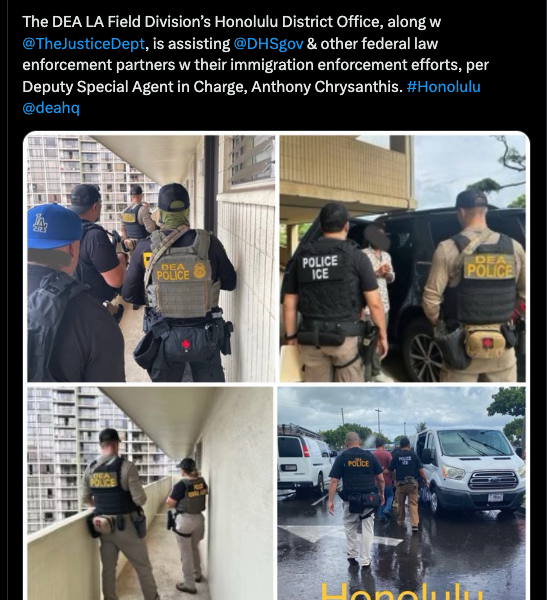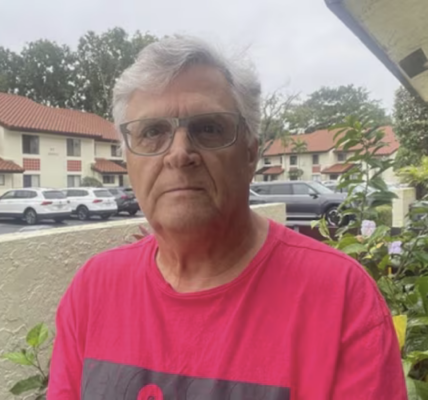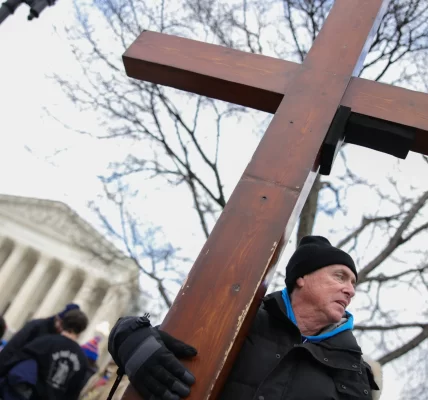Immigration Crackdown Begins In Hawaiʻi As Advocates, Lawmakers Push Back

The first signs that President Donald Trump’s crackdown on immigrants had reached Hawaiʻi came this week, on the eve of hearings for state legislation intended to push back.
While precise numbers are hard to come by, federal immigration authorities appear to have arrested at least 20 undocumented immigrants in Hawaiʻi in the week since Trump took office.
That’s a higher number than usual for that short time period, said attorney Gary Singh, who represents several of those arrested.
The Immigration and Customs Enforcement agency did not respond to a Tuesday request for comment or more details on the recent operations. But federal agencies announced the stepped-up actions with social media posts of arrests in locations around the nation, including in Honolulu where a post by the Drug Enforcement Administration out of Los Angeles announced they were assisting their Honolulu counterparts.

So far, those arrested in Hawaiʻi have been people who likely would already have been targeted for arrest: undocumented immigrants convicted of felony crimes or those who had been given final deportation orders. That’s according to Singh and advocates, who are trying to prepare the immigrant community for an onslaught of enforcement operations while also putting in place legal fences to protect immigrants.
“It’s just round one,” said Singh, who added that people who have overstayed visas or who may have married to obtain legal residency could be next in line.
Lawmakers, meanwhile, have advanced four immigration-related bills to be heard Wednesday that advocates believe are critical to putting up guardrails to protect immigrants from an administration eager to see them quickly gone. Another, to be heard Thursday, would push back on a Trump order rescinding a policy limiting where immigration enforcement actions can take place.
There are between 41,000 and 51,000 undocumented immigrants in Hawaiʻi, according to estimates from the U.S. Census Bureau and the Migration Policy Institute, roughly half from the Philippines.
“We have to take into account how much good immigrants provide in our economy, whether that’s our labor or in job creation,” said Rep. Greggor Ilagan, who sponsored three of the bills being heard Wednesday. “We also need to understand that in Hawaiʻi we have a diverse population, and we are composed of a lot of different immigrants that came from around the world. And that’s part of our culture.”
Bills To Ensure Due Process
In a sign of the sense of urgency surrounding the issue, Ilagan — chair of the Economic Development and Technology Committee where the bills will be heard Wednesday — said he brought the proposed legislation forward ahead of 122 other bills “so they can be heard and fast-tracked through.”
Several bills on the table are aimed at making sure immigrants targeted by immigration authorities are afforded their legal rights.
One, House Bill 438, would appropriate funds for a program so people in immigration court have access to an attorney. Another, House Bill 457, would require state and local law enforcement agencies to notify people in custody — in their native language — of their rights before immigration agents interview them. That bill would also require a person’s attorney to be notified before immigration authorities take them into custody.
“I think people have forgotten in all this bombastic rhetoric out there that people have constitutional rights, regardless of your immigration status,” said Sandy Ma, community and policy director at The Legal Clinic, a Honolulu-based nonprofit that has offered legal, education and advocacy services to immigrants since the first Trump Administration.

“These are really important due process and civil rights protections,” said Ma, who worked with legislators and other immigrant advocates to write the bills.
At the ACLU of Hawaiʻi, executive director Salmah Rizni said more workshops are being planned to keep immigrants apprised of their legal rights. Key among them, Rizni said, is that they don’t have to open the door unless the ICE agents have a warrant signed by a judge, and that they don’t have to speak to agents without an attorney.
“You do not need to answer questions from law enforcement about who you are, where you come from, what your immigration status is,” she said.
Advocates also said that currently, there is more angst in the community than actual enforcement activity. Liza Ryan Gill, co-coordinator of the Hawaiʻi Coalition for Immigrant Rights, called erroneous reports of ICE activity “a disrupting force.”
“Many of them are turning out to be false or unverified,” Gill said. “That is leading to even more fear within the community and folks staying at home or not taking their children to school or not working.”
Ilagan said a top priority for him is a bill he authored that would prohibit Hawaiʻi public lands from being used for immigrant detention centers.
“That would be an environment where not only tens of immigrants are being deported out, but hundreds of immigrants, if not thousands, are being held in these detention facilities,” he said. “That would be an extreme situation that we would be in, impacting a lot of lives and affecting our economy as well as our livelihood here in Hawaiʻi.”
Bill To Limit Collaboration
Whether local law enforcement agencies assist federal immigration authorities has long been a fraught question in liberal-leaning communities around the United States. Dozens of states, cities and counties have adopted “sanctuary” ordinances limiting in various ways local agencies from cooperating with enforcement actions.
Another bill Ilagan introduced would do just that, preventing state and local law enforcement agencies from collaborating with federal authorities on immigration enforcement in most instances. That bill, House Bill 22, states: “Hawaiʻi is justifiably proud of its rich immigrant heritage, which has woven many people into a valued tapestry of races, ancestral groups, religions, cultures, and languages from many parts of the world.”
“Because of the federal government having the sole authority over the state and county (on immigration matters) we can’t tell them to not do it,” Ilagan said. “But we can ensure that we don’t assist in deportation and we don’t partake in that process.”
One factor that may influence the discussion of that bill is that Trump has threatened to withhold federal aid to jurisdictions that do not cooperate with immigration enforcement operations. However, that would violate a 10th Amendment doctrine that says the federal government cannot compel states to uphold federal laws, according to Esther Yoo, a University of Hawaiʻi law professor.
“Right now (Trump) is on a tear doing all sorts of illegal things and just waiting for the lawsuits to challenge that,” said Yoo, director of the Refugee & Immigration Law Clinic at the university’s Richardson School of Law.
“I think that as a state, Hawaiʻi needs to be cautious, to make sure that our state and local law enforcement is not being deputized to go after their own communities, our own communities,” Yoo said.
Gov. Josh Green was in Washington, D.C. on Tuesday to testify against the appointment of Robert F. Kennedy Jr. for Secretary of Health and Human Services and was unavailable for comment, said Makana McClellan, his director of communications.
In December, Green announced he was budgeting $20 million over the next two fiscal years for the Attorney General’s Office to support national lawsuits opposing Trump policies.
Asked whether the department will or will not be working with federal immigration authorities to support their enforcement activities, AG spokesperson Toni Schwartz said in a written statement that “The state was not involved in Homeland Security Investigation-related immigration enforcement actions.”
Schwartz also said: “The Attorney General, as the chief legal officer, is oath-bound to enforce state laws and to stand up for constitutional freedoms and the rule of law. Attorney General Anne Lopez will continue to do so. If notified of any illegal actions, the Attorney General will assess next steps and uphold the rule of law.”
Gill said she and other advocates have been meeting with the Honolulu Police Department and other local law enforcement agencies and have been told that those departments are not working with immigration authorities but also have not been told ahead of time about the enforcement actions.
“They’re out there on Hawaiʻi state soil and we don’t really have any idea of what they’re doing,” she said of the immigration enforcement agents.
‘Storming a Third Grade Classroom’
One of the things that has most alarmed advocates for immigrants is that Trump on his first day in office rescinded a Biden-era policy that blocked federal authorities from conducting immigration enforcement actions in places such as schools, courts, hospitals and churches.
The policy was meant to ensure that undocumented immigrant families would not shy away from services such as education or health care.
A bill to be heard Thursday at the House Committee on Education, House Bill 440, would revive some of that policy on the local front. Among other things, it would only allow staff and officials at public schools or hospitals to admit Immigrations and Customs Enforcement agents to those facilities if certain conditions are met.
“This is to protect the community at large,” Ma said. “Do you really want ICE storming a second grade classroom or a third grade classroom? Or if you have your grandmother, your kupuna in the hospital sharing a room with someone else. Do you want your kupuna to be terrorized by ICE coming in? Absolutely not.”
Gill said the bill does not prevent Immigration and Customs Enforcement from “doing its job.” Rather, she said, it sets up protocols so if agents want to conduct an enforcement operation at an elementary school, for example, they would need to work through the superintendent and the principal, and conduct that operation without other minors present.
“We are just trying … to bring some process to what is feeling like utter chaos right now,” Gill said. “If the feds want to come in and arrest folks with removal orders, that is their prerogative. But they cannot trample all over us and our constitutional rights.”




